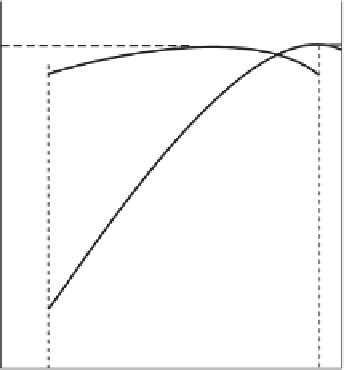Environmental Engineering Reference
In-Depth Information
max p
bmep
max P
b
p
bmep
P
b
N
i
N
m
Engine speed
Figure 8.4
A diagram of the brake mean effective pressure
p
bmep
and brake power
P
p
of an SI engine at
wide open throttle, as a function of engine speed
N
.
pressure
p
bmep
varies only moderately over the range of speeds between normal idling speed
N
i
[typically 800 rpm (13.3 Hz)] and the speed
N
m
at maximum power. It reaches its maximum value
max p
bmep
at a speed about two-third of
N
m
.
At constant throttle setting or inlet pressure, the brake torque does not change much with
engine speed. At low speeds, the torque declines somewhat due to heat losses from the cylinder.
At high speed, the torque declines more precipitously, as pressure losses in the inlet and exhaust
valves and increased piston friction reduce the brake mean effective pressure and cause the brake
power to peak. To improve high-speed power, multiple inlet and exhaust valves may be used and
the engine may be supercharged.
The characteristics of a sample of model year 2000 passenger cars and light duty trucks
equipped with SI engines are listed in Table 8.2, in order of ascending engine displacement. The
bigger, more powerful engines employ more cylinders, but the cylinder volume is more nearly
the same among these engines than is the size. There are only small differences in the maximum
brake mean effective pressure among these engines, and there are comparably small differences in
power per unit of engine displacement. As we shall see below, the differences in engine size reflect
the differences in vehicle mass, ability to accelerate, and vehicle fuel economy.
8.3.1
Engine Efficiency
The fuel economy of the engine is usually expressed as the
brake specific fuel consumption (bsfc),
the ratio of the mass of fuel consumed per unit of mechanical work output by the engine shaft.
The value of the brake specific fuel consumption depends upon the engine operating conditions.
For SI engines, the most economical (i.e., the minimum) bsfc is about 0.27 kg/kWh, while for

